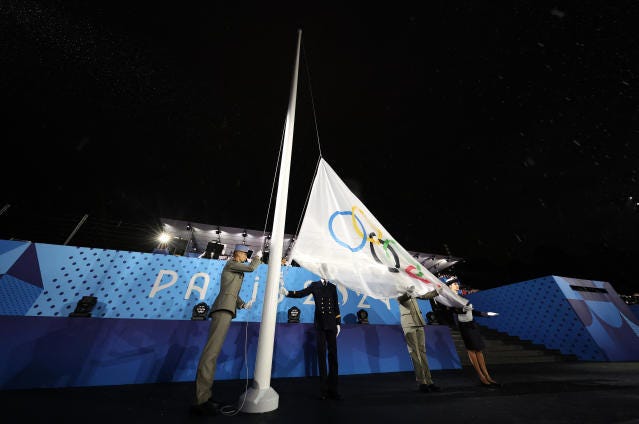The Oops-lympics
The Games Got off to an Inauspicious Start
I’ll never know exactly what happened during the opening ceremony of the 2024 Olympics in Paris because I did not, do not, and will never have the time to watch all four hours of it. But the moment where they hung the Olympic flag upside down felt appropriate if not a little on the nose.
I say that not to comment on the spectacle. That isn’t something I’m interested in doing. Olympic opening ceremonies are no different than Super Bowl halftime shows. They’re big, decadent displays made up of imagery and music that’s easy for me to stuff into a bucket labeled “I guess it’s cool you came up with this but I don’t know why you did and I don’t really want to.”
What I’m talking about is how bad of a time the organizers have had putting the games together.
Take last week’s recall of Olympics branded water bottles. The bottles contained excessive levels of Bisphenol A. French regulatory agencies link this chemical to infertility and a not insignificant health condition called breast cancer.
In defense of the event’s organizers, they only licensed the Olympics brand out and did not personally or knowingly put tumor powder in the water.
But they probably should have been more careful about who they made their business deals with. The Paris 2024 Olympics organizers and event managers were raided by French financial prosecutors in relation to an ongoing investigation into “illegal taking of interest, favoritism, and concealment” in the rewarding of contracts. This is, as far as I know, unrelated to the water bottles.
Unrelated to financial crimes but very related to water, the funniest bit of drama surrounding the Paris Olympics has to be the controversy around the Seine, which officials have insisted on using for swimming events even though swimming in the Seine has been banned for a century.
Why has swimming in the Seine been banned for a century? Is it some kind of snooty French thing? No, it’s because it’s full of bacteria.
Undeterred by little old things like “E. Coli” and “common sense,” Olympic organizers embarked on a clean-up operation. It’s unclear to me what the costs for this was on a line-by-line basis because I haven’t tried very hard to find out, but most reporting indicates the total was $1.5 billion. For context, that is the global box office intake of Top Gun: Maverick. With that money, you could feed the hungry with around 169 million Subway sandwiches.
The cleanup was marked by difficulty from the start. Test events in 2023 had to be cancelled due to sewage. And heavy rain in Spring 2024 sent polluted overflow into the river. Eventually, organizers were able to overhaul the Seine’s infrastructure, adding new underground pumps and pipes and tanks to collect sewage spillovers before they can enter the river.
Despite failing to pass bacteria test after bacteria test, organizers continued to insist that the Seine would be safe to use for the events. The Mayor of Paris, Anne Hidalgo, and the French President, Emmanuel Macron (who I insist on calling President Macaroon because I’m extremely mature), vowed to swim in the Seine prior to the Olympics in order to prove that the clean-up worked.
But the swims got postponed so Macaroon could focus on the snap election he had called. Others say it was because he got wind of a planned protest which would have involved Parisians “openly defecating in the city’s famous Seine River.” Personally, I think Macaroon called the snap elections just to get out of swimming in an infected river.
On July 12 (5 days after Macaroon was spared humiliation in the snap elections), the Paris City Hall announced claimed that the river was safe to swim in. The Parisian Mayor kept her word and took a swim. Rather than swim in the river himself, Macaroon’s sent one of his cabinet ministers, the Minister of Sport, to take a dip in his stead. Neither the Minister nor the Mayor got sick, or if they did it didn’t reach the press. Only time will tell if the fixation on swimming in the Seine backfires on the organizers.
Speaking of fire, “France's high-speed rail network was hit by ‘malicious acts’ including arson attacks” that disrupted the French rail system hours before the opening ceremony of the Paris Olympics. This resulted in French train stations resembling a Spirit Airlines terminal.
Security officials are blaming “the extreme left” but admit they have no evidence. The BBC poured cold water on the theory by pointing out the attacks were too organized to be by “the extreme left.” One security expert (who is me but in a funny hat) added that the attacks were too organized to be carried out by Olympic planners.
Ultimately, the greatest threat to the Olympic Games is neither the extreme left, nor the Seine, nor Parisians pooping in the Seine. It’s the heat. The 2024 Olympics are projected to be the hottest on record.
The previously hottest Games on record were in 2020. Athletes repeatedly expressed that the heat was affecting their health whenever they weren’t fainting from the heat.
The International Olympic Committee want athletes to know they have been seen and heard, and are taking climate change very seriously. They wrote a report named after a Johnny Cash song: “Rings of Fire: Heat Risks at the 2024 Paris Olympics.” And look at all that graphic design. Only serious people spend that much time in Adobe InDesign.
The report included heat mitigation suggestions. They said that they should reschedule events to avoid the hottest times of day, that they should tell athletes to stay out of the sun, and to hydrate, hydrate, hydrate. Good thing they’ll have plenty of Olympics branded water bottles on hand!


